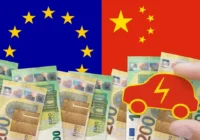Italy’s new deal with the European Commission evokes ghosts of the past and raises big questions about the future of the eurozone.
Italian banks are in trouble. In the recent market turmoil, share prices of Italian banks have dropped dramatically. As per the Financial Times, Italian banks have more than €350 billion of bad debt. Put simply, this is debt where borrowers are not paying repayments as they originally promised to, and the loan itself may never be repaid. It is little surprise that confidence in Italian financial institutions has evaporated, credit is hard to get and the Italian economy is gasping for air.
This week, Italy announced a deal with the European Commission (EC) that allows it to guarantee its bad debt. Here’s how it is supposed to work. Italian banks will offload their bad debt to private players like hedge funds and alternative asset managers. Some of these institutions are looking to increase returns. They will buy this “distressed debt” at a deep discount. The government is guaranteeing this debt to ensure that the losses these institutions suffer are capped should things go belly up.
Many governments are keen to create private markets for bad loans, and this is what the Italian government is aiming to do. This broadens the pool of creditors, lowers the cost of debt and spreads risk. Most importantly, banks get rid of bad debts from their books. They become healthier and can resume normal activities such as lending to businesses and individuals. Just as in a patient who has open heart surgery, credit flows again and the economy recovers to good health.
So, what’s the catch with such an eminently sensible proposition?
First, there is no guarantee that the Italian government’s guarantee will work. Markets have reacted skeptically. They have good reason to do so. The details of the deal are sketchy. The Italian government is in charge of a fast-aging country with high unemployment. Apart from pasta, football and la dolce vita, Italians love tax evasion. When the push comes to shove, the Italian government might not have the money or the political will to fulfill its guarantee.
Why not simply write the bad debts off, take the hit in the gut, recapitalize banks if need be, and march on to create a healthier system? And whilst doing so, rationalize Italy’s Byzantine regulations that are honored more in the breach than observance? Why not reform a convoluted tax system that no one understands except accountants? What about reforming an education system that churns out a notoriously poorly skilled workforce? Also, how about rewriting labor laws that do not make any sense?
The Italian government finds these questions suitably thorny. Therefore, it has plumped for a deal that promises quick rewards and much less pain.
Second, this week’s deal raises a fundamental question regarding risk and reward in the global financial system. Italy disingenuously claims that its deal with the EC will not cost the taxpayer money. The deal will stimulate the economy and, as a result, generate revenue. Yet it is an incontrovertible fact that Italian taxpayers are taking a risk. If things go wrong, they end up footing the bill to cover the losses of private investors. If things go right, then these private players rake in profits.
This has happened before. As Karl Otto Pöhl points out, the 2010 Greek bailout “was about protecting German banks, but especially the French banks, from debt write offs.” He recommended slashing Greek debt by a third, but was ignored by the powers that be. Instead, the troika of the European Central Bank (ECB), the European Commission and the International Monetary Fund (IMF) threw good money after bad. They replaced private debt with public debt, enriching the rich by robbing the poor for the lofty goal of inspiring confidence in the economy.
Hank Paulson, the former US treasury secretary and head honcho of Goldman Sachs, did the same under President George W. Bush. Financial institutions who took reckless risks were bailed out by taxpayer money. Top managers of these institutions cynically used this money to help themselves to multimillion dollar bonuses. They justified their bonuses on narrow legalistic arguments. They were promised bonuses by the banks in their contracts. These contracts were sacred and made them creditors because the bank owed them money. Legally, they had first claims as creditors and bonuses were their sovereign prerogative. The minor point that the banks themselves would not exist if the taxpayers had not bailed them out was mere piffle.
The bailouts during the Great Recession of 2008 shook not only the economic foundations of the current financial system, but also its legitimacy. Financial markets work not because they are necessarily efficient. Markets work because people believe in them. If people are not sure that they will get 800 grams of potatoes when they are promised 1 kilogram, or when they suspect that they will be sold a bad second-hand car when they are promised a good one, then trust evaporates and markets eventually disappear.
Today, markets are suffering a crisis of faith. Economists, its high priests, and bankers, its swashbuckling knights in sharp suits, are seen as charlatans and thugs. They are seen as members of a sordid system where the rich rob the poor to swill champagne and gorge foie gras.
People suspect that Italy’s deal might end up becoming another bailout. Besides, many remember another deal whose ghost is haunting the eurozone every day. When the ECB launched the euro, Italy had failed to meet the Maastricht criteria to join the currency union. In the style of the Mafia, Camorra and Ndràngheta, the Italian government did an “off the record, on the Q.T. and very hush-hush” deal with none other than Paulson’s gang, the splendidly glorious Goldman Sachs.
 The Goldman deal was breathtakingly simple. Even better, it was totally legal. The land of Niccolò Machiavelli and Luca Pacioli, the father of modern accounting who created the system of double-entry bookkeeping, entered into a swap deal with Goldman. It converted a foreign currency debt into a domestic currency obligation. By using a fictitious exchange rate and rigging interest rates, Goldman waved its magic wand and made debt disappear from Italian books. It was creative accounting at its finest. Italy could adopt the euro and the European Union (EU) embarked on its new single currency experiment. In return, the golden boys of Goldman pocketed a hefty fee. To paraphrase Robert Browning, God was in heaven and all was right with the world.
The Goldman deal was breathtakingly simple. Even better, it was totally legal. The land of Niccolò Machiavelli and Luca Pacioli, the father of modern accounting who created the system of double-entry bookkeeping, entered into a swap deal with Goldman. It converted a foreign currency debt into a domestic currency obligation. By using a fictitious exchange rate and rigging interest rates, Goldman waved its magic wand and made debt disappear from Italian books. It was creative accounting at its finest. Italy could adopt the euro and the European Union (EU) embarked on its new single currency experiment. In return, the golden boys of Goldman pocketed a hefty fee. To paraphrase Robert Browning, God was in heaven and all was right with the world.
Italy was not the only country playing footsie with the rules. In 2010, Der Spiegel reported that Goldman had “helped the Greek government to mask the true extent of its deficit with the help of a derivatives deal that legally circumvented the EU Maastricht deficit rules.” This deal was based on the Italian one and helped Greece join the eurozone. Goldman was smiling all the way to the bank, and unsuspecting tax payers were unknowingly left with a fat bill. At a time when the Greece debt crisis is still playing out, the Italian government makes protestations that this time things are different. However, this sort of deal-making has gone awry far too many times so far. This system of socialism on the downside and capitalism on the upside has to come to an end.
Third, the Italian deal raises fundamental questions about the future of the EU. Across Europe, skeptics are attacking the EU for its democratic deficit. Incestuous elites in Brussels decide the destiny of Europe without bothering to consult the people. Many believe that the EC and ECB are fixated with austerity. They fear that capital is sacrosanct and people like Mario Draghi, the Italian boss of the ECB who once worked for Goldman Sachs, still puts the interests of his former employers first. Just as markets work when people believe in them, so do institutions. Sadly for Brussels, the EU project itself is experiencing a crisis of faith.
Both the left and the right are increasingly making the same arguments against the diktats that Brussels delights in issuing. Local communities and national governments are chafing against EU institutions like the EC and the ECB. Italy had to bargain very hard to arrive at a deal with the EC. There are numerous EU rules prohibiting state aid to struggling banks. Italy wanted to push through a more sweeping “bad bank” plan but had to defer to the EC. The negotiations, whilst tough, papered over an unresolved contradiction. Is the EU an optimal currency union?
As The Economist points out, Italy’s experience within the eurozone has been miserable. It has been in recession for five of the last eight years. Its per capita income after adjusting for inflation is lower than in 1999. Italy’s sovereign debt has now crossed 130% of its GDP. Italian productivity has been falling and the economy is ridiculously uncompetitive. The same is largely true of Spain, Portugal and Greece. Currency unions do not necessarily need homogeneity. However, the constituent units need to have enough similarity to function together. This similarity could be political or it could be political or social. In the US, New York and California are willing to subsidize Mississippi and Alaska. However, Germany and Denmark are flinching when it comes to supporting Italy or Greece.
The Berlin Policy Journal sums up the issue in a nutshell. The French were terrified of the rise of Germany after reunification. In 1988, François Mitterrand, then-president of France, described the deutschmark as “Germany’s Atom Bomb.” To defuse it, Jacques Delors, Mitterand’s socialist comrade who was the big boss of the EC, came up with the immaculate conception of the euro. Yet this immaculate conception has turned out to be Europe’s original sin.
Lumbering oxen like Greece have been yoked together with fleet-footed workhorses like Germany with no one holding the reins. Oxen employed wizards like Goldman Sachs whose hush-hush deals transformed them into horses, at least on paper. All was supposed to go swimmingly well, but the eurozone cart keeps lurching from crisis to crisis.
How surprising? Might yet another deal set a few things right?
*[You can receive “The World This Week” directly in your inbox by subscribing to our mailing list. Simply visit Fair Observer and enter your email address in the space provided. Meanwhile, please find below five of our finest articles for the week.]
Education Alone Cannot Eradicate Poverty
A top-down, one-size fits all approach to achieve Goal 4 of the Sustainable Development Goals will not solve the issue of poverty.
In the developing world, one primary school looks like any other primary school. Although the children and teachers might speak different languages, the desks are always in military rows, the Oxford University Press textbooks are always torn, and the teachers always write in chalk and chant ABCs that the children always parrot. The exception, of course, is when children have no desks at all.
It becomes almost routine to visit, wait to be served tea or coffee with biscuits, listen to principals complain in great depth about the lack of funding and government corruption, and nod sympathetically. Colonial heritage is often evident in the out-of-place uniforms and the confusing use of several language mediums.
Population growth in the Middle East and North Africa, South Asia and Sub-Saharan Africa mean that more of these startlingly similar primary schools pop up in different guises: government schools, low fee… Read more
The Miracle of Bernie’s Candidacy: The Holiday Story You Won’t Be Told
The rise of Bernie Sanders in the US presidential polls feels like a holiday miracle.
Senator Bernie Sanders heads into New Hampshire more than 25 points ahead and into Iowa on the up, despite the array of forces aligned against a candidate who highlights the cost of our concentrated wealth. Sanders was virtually blacked out of the media and Democrat debates were severely limited. The Democratic presidential candidate doesn’t even have the foundational work of the “liberal class” to build on: Many “liberal” institutions have shied from effectively advancing progressive ideals that conflict with donor interests.
In a functional democracy, there might not be a “Bern” to feel. Sanders would be an ordinary politician whose consistent positions have been guided by the public interest. “One of 565,” we’d yawn, “and not even blessed with out-of-this-world looks or charisma.” The freshness and resonance of Bernie’s candidacy speaks powerfully to major failures of American democracy.
Hillary Clinton feels this widespread frustration in America. She has tried to frame herself as… Read more
Brexit is More Complicated Than You Think
What would happen if the UK left the European Union? Former Irish Prime Minister John Bruton explains the different options.
In June, the people of the United Kingdom may vote to leave the European Union (EU). At the moment, a narrow majority favors remaining in the EU, but a large group is undecided. That group could swing toward a “leave” position for a variety of reasons, including what might be temporary EU problems with refugees. However temporary the reasons might be, a decision to leave would be politically irreversible.
It would be wise for Ireland to give thought now as to how it might react to a decision by UK voters to leave the EU, and how it would play its hand in the subsequent negotiations. A number of scenarios will arise and Ireland needs to identify its red lines in each one of these.
The negotiation of a UK withdrawal from the EU will be done under Article 50 of the Lisbon Treaty. It will have to… Read more
A Very Russian Murder
A culture of impunity is endemic at the Kremlin.
If there was ever a case of cloak and dagger, this was it: Alexander Litvinenko, a former KGB agent working for MI6, an outspoken critic of the Kremlin and President Vladimir Putin with a close connection to a renegade oligarch—Russia’s “Gray Cardinal” Boris Berezovsky, now also dead under mysterious circumstances—poisoned by a rare nuclear isotope on British soil by his business partner and former FSB colleagues. It was a moment when the Cold War spilled over the edge of its new order container. Richard Howell, the lawyer representing London police, called it a “nuclear attack on the streets of London.”
Now, a British judge has ruled in a public inquiry that the two men charged with the murder by the Crown Prosecution Service in 2007—Andrey Lugovoy and Dmitri Kovtun—were responsible for carrying out the assassination. Sir Robert Owen concluded that: “Taking full account of all the evidence and analysis available to me, I find that… Read more
Tracing the Genesis of Terrorism in Pakistan
Ever since a “monster” was unleashed in the 1970s, terrorism and sectarianism have been a regular occurrence in Pakistan.
Growing up in Lahore in the 1960s and 1970s, there were hardly any organized attacks on public institutions as we now see in present-day Pakistan. Sure, we heard about the atrocities committed by both sides in the India-Pakistan partition of 1947; we were informed of the occasional political assassinations (Liaquat Ali Khan); we learned about the military crackdown on the anti-Ahmadiyya riots of 1953; we actively participated in student demonstrations against the dictatorial regime of Ayub Khan; and we expressed collective disgust at the flip-flop shenanigans in the era of the senior Bhutto.
By and large, however, Lahore was a lively place embodying religious harmony and rule of law—though the British always denied “access to justice.” There was a Christian chief justice of the Supreme Court. Ahmadis held high positions in the bureaucracy. Atheist poets and thinkers congregated at smoke-filled cafes. Missionary schools abounded. And the horse-driven carriages… Read more
The views expressed in this article are the author’s own and do not necessarily reflect Fair Observer’s editorial policy.
Photo Credit: Marco Aprile / Shutterstock.com
 We bring you perspectives from around the world. Help us to inform and educate. Your donation is tax-deductible. Join over 400 people to become a donor or you could choose to be a sponsor.
We bring you perspectives from around the world. Help us to inform and educate. Your donation is tax-deductible. Join over 400 people to become a donor or you could choose to be a sponsor.
Support Fair Observer
We rely on your support for our independence, diversity and quality.
For more than 10 years, Fair Observer has been free, fair and independent. No billionaire owns us, no advertisers control us. We are a reader-supported nonprofit. Unlike many other publications, we keep our content free for readers regardless of where they live or whether they can afford to pay. We have no paywalls and no ads.
In the post-truth era of fake news, echo chambers and filter bubbles, we publish a plurality of perspectives from around the world. Anyone can publish with us, but everyone goes through a rigorous editorial process. So, you get fact-checked, well-reasoned content instead of noise.
We publish 2,500+ voices from 90+ countries. We also conduct education and training programs
on subjects ranging from digital media and journalism to writing and critical thinking. This
doesn’t come cheap. Servers, editors, trainers and web developers cost
money.
Please consider supporting us on a regular basis as a recurring donor or a
sustaining member.
Will you support FO’s journalism?
We rely on your support for our independence, diversity and quality.











